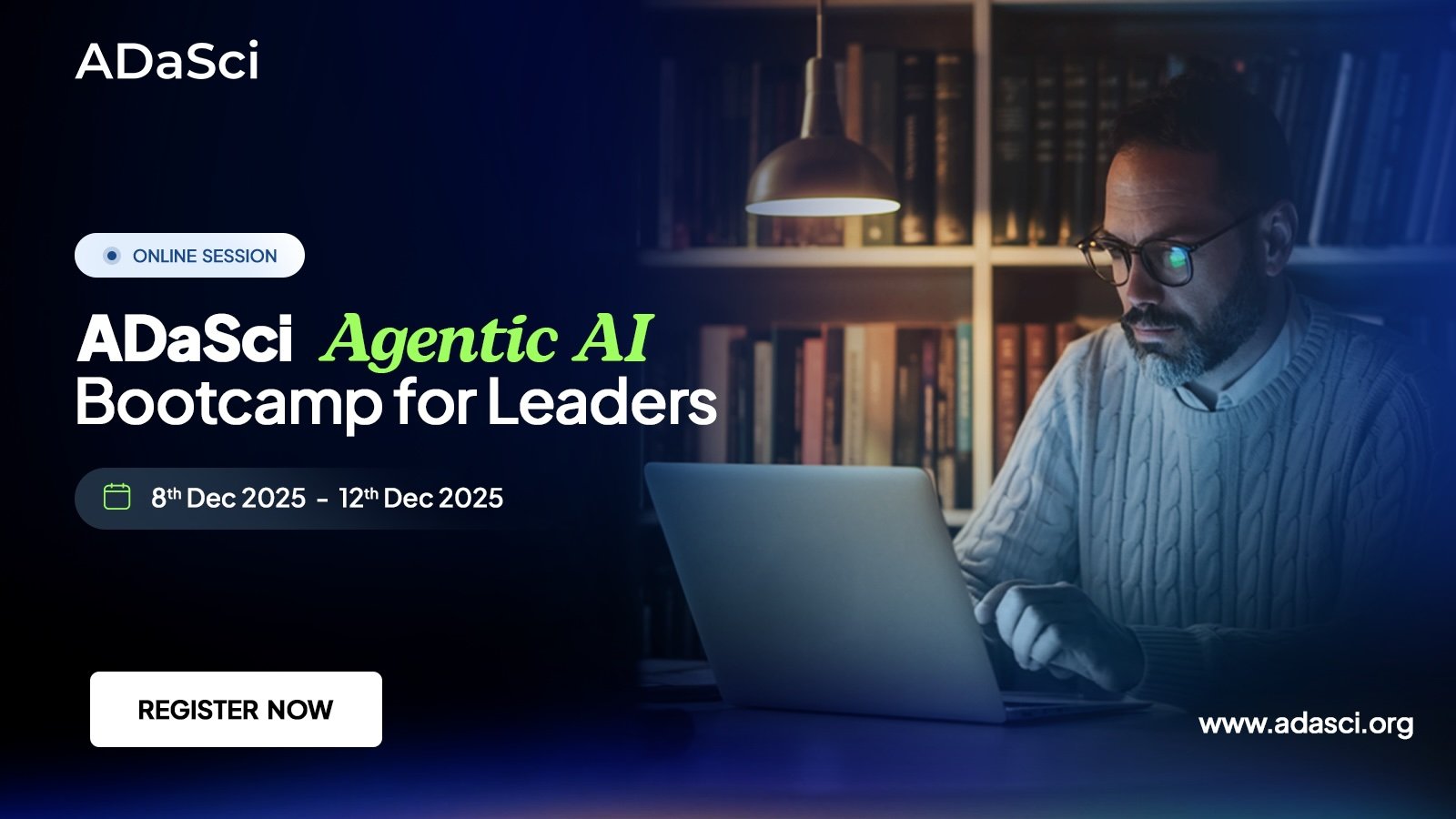The CXO’s Role in Building Agentic AI-Ready Talent

Explore more from ADaSci
As the next wave of artificial intelligence unfolds, enterprises are moving beyond task-based automation into the realm of autonomous systems—where AI agents can perform multi-step tasks, coordinate across functions, and adapt in real time. This paradigm, known as Agentic AI, is rapidly transforming how organizations operate. These intelligent agents aren’t just tools; they are digital collaborators capable of planning, reasoning, and acting with minimal human oversight. In this shift, the role of the workforce changes dramatically—and with it, the role of leadership. For CXOs, preparing their organizations for agentic AI is no longer a future consideration but a present-day responsibility. This article explores the capabilities required in an agentic AI-ready workforce, the strategic role CXOs must play, and how initiatives such as ADaSci’s enterprise upskilling programs can provide a strong foundation for this transformation.
Agentic AI is Reshaping Work
Agentic AI refers to autonomous, goal-driven systems that can make decisions, plan actions, and carry out tasks on behalf of users. Unlike traditional automation, which typically follows scripted rules and limited workflows, agentic AI can respond to dynamic environments, interact with other agents or systems, and optimize its behavior over time. This capability opens doors to more complex applications—from orchestrating customer journeys and automating legal reviews to managing IT infrastructure or financial planning workflows.
However, adopting agentic AI is not just a technological upgrade. It’s a workforce transformation challenge. The introduction of such autonomous systems alters job roles, decision-making hierarchies, and collaborative practices. Employees need new mental models, skills, and workflows to work effectively with intelligent agents. This demands a coordinated shift—led by CXOs who understand the broader implications and are prepared to invest in the future-readiness of their teams.
Why CXOs Must Lead the Talent Transformation
CXOs have always been central to enabling change. In the case of agentic AI, they must go beyond technology implementation and take responsibility for shaping talent strategies that align with this new era. The success of agentic systems depends less on their algorithms and more on how well the people around them understand, design, and manage their behavior.
This is not a challenge for HR alone. It requires CXO-level commitment to identify capability gaps, design role-specific learning journeys, and integrate learning into the flow of work. Whether it’s the CIO rethinking IT operations with agentic support, or the COO redesigning supply chains with autonomous coordination, leadership must start with a clear vision of how humans and agents will co-exist—and build talent systems accordingly.
Key Capabilities Needed in an Agentic AI Workforce
Preparing a workforce for agentic AI adoption requires more than teaching employees how to use a new interface. It involves cultivating foundational thinking patterns and applied skills, such as:
- Systems Thinking and Process Orchestration: Understanding how workflows operate across departments and how agents can integrate into them.
- Prompt Engineering and Task Automation: Designing effective instructions and triggers for agents to execute tasks with precision.
- Human-AI Collaboration Design: Structuring handoffs, feedback loops, and oversight mechanisms between humans and agents.
- Risk Awareness and AI Governance: Recognizing limitations, ethical considerations, and the need for transparency in agentic decisions.
- Continuous Experimentation and Feedback Loops: Encouraging teams to test, iterate, and improve how agents perform in real-world environments.
These capabilities are not theoretical. They must be practiced in context, with real tools, real use cases, and real consequences.
From Training to Transformation: The Role of Upskilling
Traditional training methods—such as one-time workshops or awareness sessions—fall short in preparing employees for agentic AI. What’s needed is a deep, applied approach to learning.
Learning by doing becomes essential. Teams should engage in project-based upskilling, where they learn to build, test, and deploy agentic systems in sandbox environments. Structured mentorship accelerates this process by pairing learners with experienced practitioners who can guide them through challenges and opportunities.
Just as important is creating a learning culture where experimentation is encouraged, where cross-functional teams can explore how agentic workflows reshape their current processes, and where continuous improvement becomes the norm.
The CXO’s Playbook for Talent Readiness
To build agentic AI-ready teams, CXOs can lead with a practical roadmap:
- Sponsor enterprise-wide agentic fluency programs that educate not only technical teams but also business leaders on agentic AI fundamentals.
- Promote cross-functional learning labs where departments collaboratively prototype agent-driven workflows and assess their feasibility.
- Identify and support internal AI champions—early adopters and innovators who can scale enthusiasm and best practices across the enterprise.
- Measure capability maturity, not just tool usage. Assess how deeply teams can design, manage, and improve agentic systems.
- Reward initiative and learning, reinforcing the value of upskilling and collaboration over isolated performance metrics.
Such a playbook, when championed at the CXO level, sends a clear signal that agentic readiness is a strategic priority.
ADaSci’s Enterprise Upskilling Solutions for Agentic AI
As organizations seek to operationalize this readiness, the Association of Data Scientists (ADaSci) offers a suite of enterprise learning solutions tailored to agentic AI adoption.
Customized Training Programs are designed to match the specific workflows and strategic goals of industries such as BFSI, manufacturing, and healthcare. These programs blend technical depth with business relevance, ensuring teams learn how to apply agentic AI within real functional contexts.
The Certified Agentic AI System Architect program serves as ADaSci’s flagship credential for mid- to senior-level professionals. It offers hands-on experience in building agent-based systems, orchestrating multi-agent workflows, and integrating agents into enterprise platforms. The program includes simulations, use-case labs, and design thinking modules to foster real-world confidence.
For ongoing learning, ADaSci offers a growing portfolio of self-paced, modular courses covering:
- Prompt engineering
- Multi-agent collaboration
- Agent safety and ethics
- Integration with ERP, CRM, and cloud platforms
These can be complemented by Expert Mentorship Programs, where learners receive one-on-one guidance from seasoned AI architects, ensuring deeper engagement and practical problem-solving.
Case for Action: Why Now
The pace of innovation in agentic AI is accelerating—and the capability gap is widening between organizations that invest in talent transformation and those that don’t. Competitive advantage will come not from AI adoption alone, but from how well human teams can think, work, and build alongside autonomous systems.
Preparing for agentic AI is not a one-time project. It’s a multi-year journey that requires vision, investment, and cross-functional commitment. That journey must begin today.
Final Words: CXOs as Talent Architects in the Age of Agentic AI
CXOs are no longer just technology enablers—they are capability architects. Their ability to reimagine the workforce, foster applied learning, and institutionalize agentic AI fluency will define the next generation of enterprise success.
By partnering with trusted learning bodies like ADaSci, CXOs can build robust, scalable, and future-proof programs that ensure their teams are not only ready for agentic AI—but able to lead with it.
The window for inaction is closing. CXOs must act decisively to prepare their organizations—not just for the technology shift, but for the talent revolution it demands.


![[Upcoming Webinar] Autonomous Enterprises: How to leverage Agentic AI in Enterprises?](https://adasci.org/wp-content/uploads/2025/10/Adasci-Webinar-1-300x300.png)





